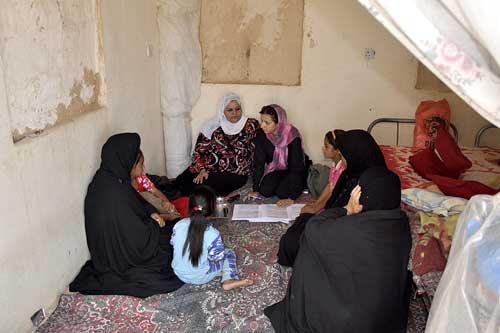She looked no more than 18 years old, despite the heavy makeup. With thick dark hair, striking features, brown eyes and a mouth that never seemed to smile, this beautiful Iraqi girl intrigued me.
She always sat in the same spot in the lobby of a Baghdad hotel, always in a black sleeveless dress.
She would show up after sunset, and just sit there, not looking at anyone.
One day, I decided to talk to her. I used to sketch when I had the time, and she had a striking image. I sat next to her and said hello, to which she didn't respond. She looked up at me, and I saw how tired she was.
I finally understood what it means that someone has "old eyes".
"You should not be sitting next to me, they will label you," she said. I looked around, and true enough, men were watching us. The Iraqis, other Arabs and westerners, mostly journalists and businessmen, were stealing looks in our direction.
I can't tell you how much I hated men at that moment. Looking back, I particularly dislike some of the journalists who, I later found out, were taking advantage of desperate people while reporting in Iraq.
The young woman wasn't in a talkative mood and bluntly she told me she was a "lady of the night".
It was the first time I had met an Arab prostitute and I didn't know how to react to it. Post-Saddam Iraq was so full of desperation, I wasn't surprised that people were forced to do things they never would have imagined they would do.
"Where is your family? Why aren't they helping you? Why are you doing this?" I asked, all in a rush. She looked at me. "It is because of family that I am doing this," she said. "The men died, or are fighting or have escaped out of the country."
I have written stories on human trafficking, and met women forced into prostitution by "employers". I have met showgirls in Lebanon who were abused, essentially kidnapped from poor countries and brought to "entertain" clients.
This week, The National columnist Hassan Hassan wrote about how Arab men are taking advantage of the desperate situation in Syria and trafficking women, sometimes under the cloak of marriage.
Activists who have worked with refugees - Palestinian, Iraqi, Bosnian - warned this would happen.
Refugee camps are always easy targets for human traffickers, as they are for terrorist recruiters.
When I hear someone is looking for a "nice, fair-skinned Shamiya girl" (Sham refers to Syria, but is often used to refer to the Levant in general), I get suspicious.
Often the man already has a wife or two, and is 20 years older than he says.
But age doesn't matter. These marriages are business transactions. There is nothing sacrosanct about them; they are easily dissolved, and often are.
How terrified these girls must be.
How alone they must feel, taken away from their families to a strange man's house, often in a country they have never seen.
A friend has been pushing me to do a story on a neighbourhood in Jeddah. It is a poorer neighbourhood, and it is known that richer Saudi men go there to find very young wives.
These are often temporary marriages, and the men send the women, sometimes just girls, back to their families divorced, and sometimes pregnant.
It is just one example of stronger, richer men preying on the weaker and poorer. Of course, this is not limited to Saudi Arabia.
As for that young Iraqi woman, I convinced her to be my guide for a day. She showed me a side of the world that I wish I had never seen: where neighbours take advantage of each other; family members abuse each other; people work as spies, others smuggle weapons.
Everything and everyone was for sale. That is what hunger will do.
This is happening now in Syria, as it happens in every wartorn country.
Ironically, she was the one who protected me. If I asked the wrong questions of the wrong people, she would help me out of a tough spot.
I kept telling her that she should work in the media; she honestly was really good at noting details. But she simply smiled.
I never did end up her sketching her, but it's OK. I know I will never forget her.
By Rym Ghazai





.jpg)










0 Comments